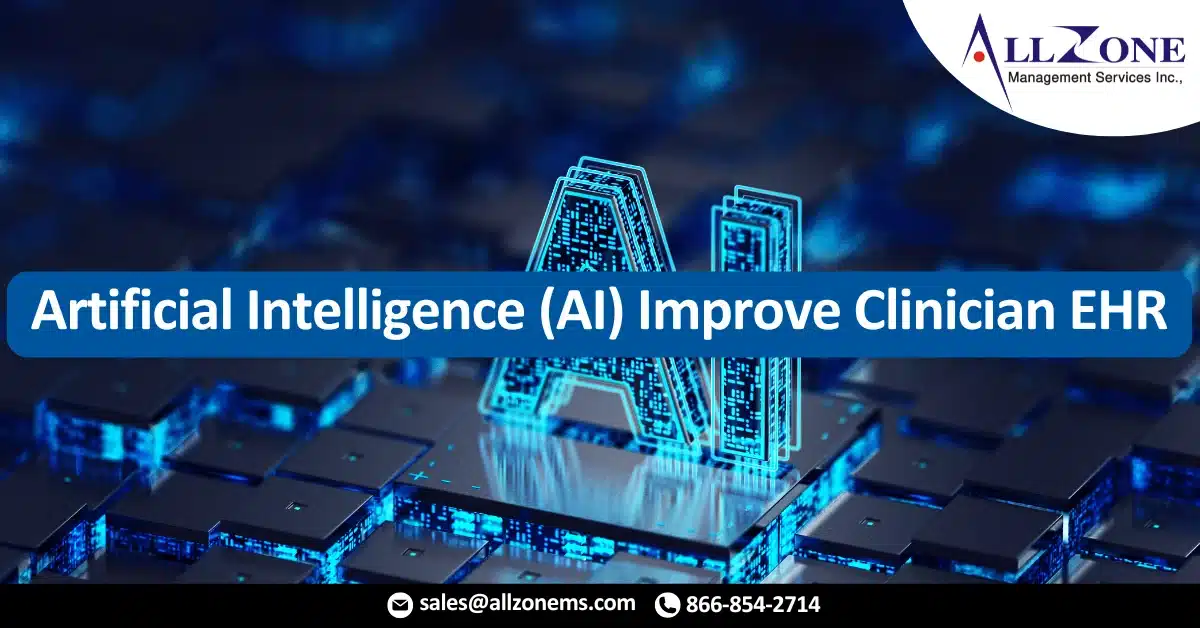The implementation of artificial intelligence into healthcare is becoming more widespread by the day.
EHRs may have worked to improve data use among medical providers, but these tools are still far from perfect. Digital medical records have introduced a host of problems, including disrupting clinician workflows, limited interoperability, and creating data overload. But with the implementation of advanced technology and the growth of artificial intelligence (AI), EHR vendors are working to improve their products.
With AI entering the healthcare field, it is taking the EHR burnout and burden away from physicians, improving interoperability, and it is aiming to leverage data for state health and human services enterprises.
TARGETING PHYSICIAN BURNOUT
Physician burnout is one of the most prevalent downfalls of EHR use. According to a 2017 study by the American Medical Association (AMA) and the University of Wisconsin, the demands of EHR data entry is dividing clinicians’ time and attention in half.
Research showed nearly six hours of a primary care physician’s typical 11.4-hour workday is devoted to EHR use.
Clinical documentation, order entry, billing and coding, inbox management, and security procedures often lead clinicians to their monitors for up to an hour and a half after leaving the office.
Clinicians at Yale New Haven Health (YNHH) experienced similar challenges, and leaders from the health system made an effort to change that issue.
“We are always looking for ways to improve the experience of our patients and clinicians, and we’re sensitive to the fact that in addition to the benefits of EHR adoption, technology can create competing demands on physician time and attention,” said Lisa Stump, senior vice president and CIO of Yale New Haven Health and Yale School of Medicine.
Google Cloud is working to fix this rampant issue by partnering with Suki, an artificial intelligence powered, voice-enabled assistant that will use its voice technology to address physician burnout.
In just over a year since its launch, Suki has already been adopted across a variety of clinical settings and in dozens of medical specialties. It works to accurately enhance clinical documentation or information retrieval from EHRs into Google’s advanced AI and machine learning technologies.
Using Suki’s voice-enable technology, the company said it has lowered the average time that its physician customers spend writing notes on EHRs from more than 13 minutes to just over three minutes, a 76 percent decrease.
IMPROVING INTEROPERABILITY
Health data interoperability still remains a problem for clinicians, despite the advent of digital health records. Most technology vendors don’t easily exchange patient information, making it hard for providers to use the EHR to improve patient care.
According to a survey from the Center for Connected Medicine (CCM), nearly one-third of hospitals and health systems reported that their interoperability endeavors are insufficient, even within their own health organizations.
However, very few of these respondents said that they are utilizing new-age tools such as application programming interfaces (APIs), AI, and blockchain to improve interoperability.
Although a limited number of organizations are currently using AI or advanced technologies, the respondents do believe that these technologies can improve interoperability.
Fifty-two percent of the respondents said that advances in tools will offer some solutions to interoperability issues. Fifty-three percent said that senior leadership commitment to interoperability will improve challenges, and 52 percent said financial incentives or penalties are the answer to data sharing problems.
“Extending advancements in interoperability to the broader healthcare ecosystem will be critical to progressing digital health initiatives and enabling new ways to serve patients,” said Janet King, a senior director of marketing insights at HIMSS Media. “Advancements in technology solutions are recognized by more than half of the healthcare leaders responding to the research as among the most critical elements to make that happen.”
LEVERAGING DATA
Researchers found that AI solutions may provide state health and human services departments with data insights to improve population health, reduce substance abuse disorders, unemployment, and homelessness.
“Data, and the ability to share data, sits at the center of these cross-governmental and health care collaborations,” researchers said. “Data has the potential to connect distinct hospitals, clinics, government agencies, and community-based organizations and provide a more complete and accurate picture of an individual and their needs.”
The team of researchers believed continued development of advanced technology is key to advancing health and human services agencies using data analytic options. Implementing AI is a must.
“The trend toward next generation technology on the data analytics spectrum appears to be artificial intelligence,” researchers said.
“Unlike traditional data analytic systems, cognitive computing can consume both structured and unstructured data and present it in ways that are actionable for decision-makers,” researchers continued. “Moreover, similar to the human brain, cognitive computing systems possess the capacity to improve and develop over time with the input of additional information.”
Training and AI implementation may bring its own set of challenges, the researchers cautioned. Setting up AI-capable systems and strategies are still in the early stages.
EHRs are not going away, meaning medical professionals will need to focus on overcoming the challenges associated with the tools to improve their workflows. By tapping into emerging technologies like AI, medical professionals and IT experts may be able to address the clinician burden, interoperability, and data use issues currently at play.
For More Information: https://ehrintelligence.com/news/how-can-artificial-intelligence-ai-improve-clinician-ehr-use

